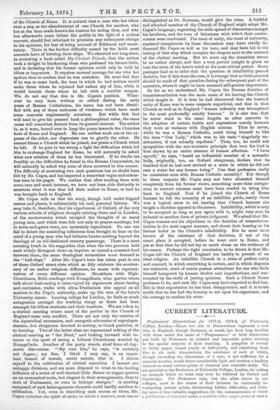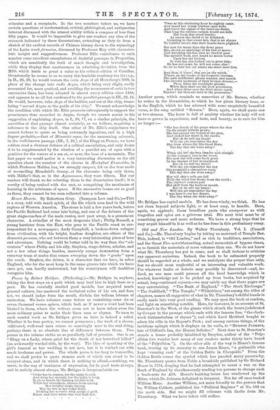CURRENT LITERATURE.
Professional Dissertations for 1871-2, 1872-3, of University College, London.—These two sets of Dissertations represent a now idea in England, though Germany, as usual, has been long familiar with them under the name of "Programmes," or brief discussions put forth by Professors on isolated and important points relating to the special subjects of their teaching. A pamphlet of twenty or thirty pages, issued yearly or half-yearly, and containing from five to six such dissertations, tho substance of each of which, though exceeding the dimensions of a note, is not sufficient for a separate treatise, would throw considerable light and awaken a healthy interest on many curious points of classical and scientific study. Wo are grateful to the Professors of University College, London, for setting an example which we trust may soon be followed by Oxford and Cambridge. Not Professors only, but the abler tutors in our colleges, must in the coarse of their lectures be continually in- vestigating minute points, discovering hidden difficulties, and form- ing more or less valuable suggestions, for tho communication of which a publication of this kind under a sensible editor might prove at once a
stimulus and a receptacle. In the two numbers before us, we have certain questions of mathematical, critical, philological, and antiquarian interest discussed with the utmost ability within a compass of less than fifty pages. It would be impossible to give our readers any idea of the research indicated by these dissertations, extending as they do from a sketch of the earliest records of Chinese history down to the etymology of the Latin word feruntino, discussed by Professor Key with character- istic insight and suggestiveness. Professor Ellis contributes to each number some excellent emendations of doubtful passages in Propertins, which are manifestly the fruit of much thought and investigation, while they display that cautiousness in admitting deviation from the MSS. which lends so great a value to his critical edition of Catullns. Occasionally he seems to us to carry this laudable tendency too far; e.g., in II., 26, 39, he would restore the ratis Argo of all Hertzberg's MSS. in place of the change into rudis Argus, which being very slight, easily accounted for, more poetical, and avoiding the recurrence of ratis in two successive lines, has been adopted in almost every edition since 1488, and appears to us all bat confirmed by the parallel passage in DI, 22, 13. He would, however, take Argo of the builder, and not of the ship, trans- lating "served Argus as the guide of his ship." We must acknowledge the erudition with which Mr. Ellis proceeds subsequently to support the prominence thus accorded to Argus, though we cannot assent to his suggestion of explaining Argon, in I., 20, 17, on a similar principle, the navalibus of that passage almost certainly, as we believe, requiring a reference to the ship itself. One other of Mr. Ellis's conjectures we cannot forbear to quote as being extremely ingenious, and in a high degree probable,—that of Mimantis aquce, for the unmeaning minantis, in the well-known passage 7, 22,) of the Elegy on Pcetus ; we have seldom read a cleverer defence of a critical emendation, and only desire it to be supplemented by the citation of a parallel use of aqua with a genitive for the waters of a sea at, or near, the base of a mountain. The last paper we would notice is a very interesting discussion on the old question about the number of the chorus in /Eschylus' Eumenides, in which Professor Malden has, we strongly suspect, hit on the true mode of reconciling Blomfield's theory_of the choreuta3 being only three, with Miiller's that, as in the Agamemnon, they were fifteen. But our readers will thank us for referring them to the dissertation itself ; it is worthy of being ranked with the rest, as comprising the maximum of learning in the minimum of space. If the successive issues are as good as these, they cannot be too soon collected into a volume.



































 Previous page
Previous page